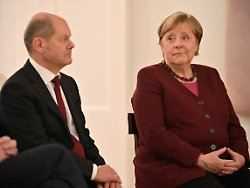Wednesday October 27, 2021
It won’t be easy
Start traffic light negotiations in detail
The traffic light parties will come together this Wednesday to negotiate a coalition agreement in 22 working groups. The working groups meet at different locations that are not announced beforehand.
Around a month after the general election, the SPD, the Greens and the FDP are entering into detailed negotiations about the formation of a joint government. Starting today, around 300 specialist politicians will come together in 22 working groups. They should draw up plans, for example for a “digital awakening”, for climate protection and social security, lifelong education, for migration, security and foreign policy. A look at key points shows that the negotiating partners are sometimes still far apart.
The working groups should work out their positions by November 10th. These should then go to the main negotiators around the party leaders, who should resolve open conflicts if necessary. A coalition agreement is to be presented by the end of November. In the week from December 6th, the Bundestag will elect the new Federal Chancellor and the new government will be formed. Angela Merkel’s successor is to be the SPD candidate for Chancellor Olaf Scholz, previously Vice Chancellor and Finance Minister. Merkel and the members of the government received their certificates of discharge from Federal President Frank-Walter Steinmeier on Tuesday, but will continue to run government until a new chancellor is elected. The SPD had become the strongest force in the federal election.
Coalition course:
The possible coalition partners set out in an exploratory paper in mid-October where the political journey in Germany should go. A massive expansion of renewable energies is to come. “Ideally” the coal-fired power generation should be phased out by 2030 – and not, as previously planned, by 2038. The statutory minimum wage is to be increased to twelve euros per hour in the first year, and the voting age is to be lowered to 16 years. Asylum procedures, procedures for family reunification and returns are to be accelerated. Taxes such as income tax, corporate tax or VAT should not be increased. The SPD, Greens and FDP now want to be more specific in the working groups. The intermediate status of the negotiations should not initially leak out.
To stop global warming, the negotiators want to set a framework for the significant expansion of wind and solar energy. However, the FDP wants to prevent too many government regulations. Especially if the coal phase-out is to work by 2030, the social question is pushed forward – not only with a view to the loss of jobs in coal regions. It is also about an effective compensation for rising energy and fuel prices. The abolition of the EEG surcharge alone should not be enough to prevent exploding costs for consumers. Another point of discussion is likely to be the reduction of subsidies that are harmful to the climate and the environment, such as the waiver of VAT on kerosene or the flat-rate commuter allowance.
Mobility:
The SPD, Greens and FDP have already cleared a sticking point: there will be no general speed limit on German motorways. Here the FDP already prevailed. And another groundbreaking decision is on the horizon: the end of the combustion engine from fossil drives. The exploratory paper refers to EU plans that all new cars should be emission-free from 2035. In Germany, the end of the fossil combustion engine could come even earlier. Otherwise, however, the mobility working group still has to deal with important issues such as rail expansion.
How big the leaps the Ampel partners can make in terms of future investments depends primarily on their finances. One does not want to take out loans, important taxes should not be increased. There is talk, for example, that in 2022, under the guise of the corona pandemic, one could run into heavy debt again – and put this money aside for investments. In addition, investments could be outsourced to public companies that run outside the budget and are allowed to take out loans despite the debt brake. But one thing is clear: In financial policy, the political ideals of the three traffic light parties are far apart. It is controversial whether the previous agreements do not leave loopholes, for example for the relief of low wage earners sought by the SPD and the Greens.
Foreign and Security Policy:
In the exploratory paper, the SPD, Greens and FDP have provided little concrete information on this topic. The working group set up for this must now primarily decide whether to take a tougher course against China and Russia in order to counteract human rights violations. The handling of the Nord Stream 2 gas pipeline between Germany and Russia is particularly controversial. The Greens are against the project, the FDP is at least skeptical and the SPD wants to stay out of it. The handling of NATO’s goal of spending two percent of gross domestic product on defense must also be clarified. Further participation in the alliance’s nuclear deterrent is also under scrutiny. Last but not least, a decision has to be made about purchasing armed drones.
Source: ntv.de, Basil Wegener, Fatima Abbas, Theresa Münch and Michael Fischer, dpa
